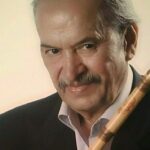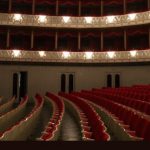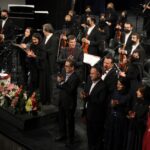Amidst the popularity of traditionalism in the Iranian music, Parviz Meshkatian (1955- 2009) moved from Neyshabur to Tehran. He learnt to play Santour and became educated in the Radif of Iranian music at the Centre for Preservation and Promotion of Music which was at the forefront of promoting the return to musical traditions. Despite his studies at a centre which promoted the use of the phrase “traditional music” in Iran, Parviz Meshkatian emerged as a creative artist whose innovative and unique ideas attracted the admiration of Iranian artists and people from different walks of life. This article studies the reason behind Meshkatian’s deviation from the wrong approach of traditionalism strongly promoted by the Centre and argues that apart from the issue of theory of Iranian music, he can be considered as Ali Naqi Vaziri’s successor.
Tag Archives: Sadjad Pourghannad
Latest posts
- Transition to Enlightenment: Six Lectures on Mozart’s String Quartets (5)
- Nasser Masoudi: The Voice of Gilan and a Legacy of Iranian Music
- Farhad Poupel: The Voice of the Shahnameh in the Orchestras Around the World
- Five Major Myths About Mozart’s Life
- Bahma Rajabi Passed Away!
- Reza Vohdani; Unveiling unpublished works, preservation of Iranian classical music
- Ahmad Pejman Passed Away!
- Timeless or Timely: The Role of Historical Context in Defining Artistic Value
- Leading the Charge in Censorship
- The Legacy of Khosrow Jafarzadeh
- Transition to Enlightenment: Six Lectures on Mozart’s String Quartets (4)
- Fereydoun Shahbazian, An Iranian Musical Icon Passed Away
From Past Days…

Maestro Hassan Nahid’s Role in Promoting the Ney
Maestro Hassan Nahid is one of the most prominent and distinctive artists who values high morals, discipline and hard work. His music activities include playing the Ney as both soloist and an accompaniment in the most important Iranian music orchestras and ensembles during the last fifty years, including the Orchestra of Iranian Instruments (Nusratullah Golpayegani), the Orchestra of National Instrumentalists of the Ministry of Culture and Arts (Payvar Orchestra), the Orchestra of Iranian Instruments (Morteza Hananeh) , Darvish Orchestra, Samaie Orchestra, Roudaki Orchestra, Maestros’ Ensemble, Aref Ensemble, as well as performances in various radio programs, many concerts in different countries, as well as a long teaching experience in the National Conservatory of Music, music universities and other music institutions to name but a few.

A Miracle in the Iranian Music: About Tehran Flute Choir’s Eight-year Tenacity
Tehran Flute Choir is a 40-member orchestra of Iran’s best flutists; Iran’s best flutists? Yes! If you write down the names of the greatest Iranian flute players who participate at concerts and contribute to academic centers in Iran, you will see that most of them are among the choir’s members.

Farshad Sanjari, Forgotten Iranian Conductor Met His Tragic End
Farshad Sanjari, one of the most renowned Iranian conductors in the 1970s in Iran died after fire broke in his apartment in Vienna on November 22, 2019. Farshad Sanjari was not involved in politics; however, he was one of the victims of the Iranian Islamic Revolution in 1979. After the victory of the Islamic Revolution, his name was never seen as the conductor of any programmes.

A Look at Ali Tajvidi’s Manifold Musical Activities (I)
Ali Tajvidi (1920 – 2004), one of the most prominent Iranian musicians, passed away sixteen years ago. He was one of the most distinguished Iranian artists. To specify one of the fields in which he was unique, one can refer to Tasnif composition. A brief review of his manifold musical activities is presented below.

A Promising Concert by National Instruments Orchestra
The National Instruments Orchestra of Iran performed its first concert amid much hope and anxiety on July 18, 2015. The Orchestra is founded by Roudaki Cultural and Arts Foundation which is a semi-private foundation in Iran. The Arts Director for the National Instruments Orchestra of Iran is cand the Orchestra Executive Director is Sadjad Pourghand.

Layla Ramezan, Iranian Pianist
Iranian pianist Layla Ramezan has always sought to create a connection between her Persian origin and the contemporary music which she encounters daily. Sound, phrasing, a particular sense of rhythm and a refined understanding of the “time of musical development” are the foremost qualities of her interpretations. Her musical and pianistic education began in Tehran at the age of 8 with Mostafa-Kamal Poortorab. Having moved to Paris and received a scholarship from Albert Roussel Foundation, she integrated the classes of Jean Micault and Devi Erlih at the Ecole Normale de Musique de Paris Alfred Cortot, where she received a Diplôme de Virtuosité in piano performance and chamber music.

Last Year under the Light of Music
Almost three months into the new Iranian year (starting March 21), it is still not too late to have a look at the last year and the challenges that the musicians faced. The following article was published on the first day of the New Year in the Persian edition of the HarmonyTalk journal.

Interview with the Makers of the New Qeychak (I)
On occasion of the 8th anniversary of launching HarmonyTalk Online Journal on 6 April 2012, Reza Ziaei, master luthier and researcher on classical music instruments (violin family), announced that the first phase of the project to improve Qeychak has borne fruit. The new instrument would feature a bowl of ribs and the material used for the surface would be wooden. Carrying out the second phase of the project took more than 7 years engaging the new members of Reza Ziaei’s Workshop. In this phase, new researches were conducted from different aspects on the Qeychak and the modern versions of the instrument which were introduced previously by other instrument makers. The available versions of the instrument were studied in terms of their weak and strong technical features.

Motherland Orchestra Broke the Spell of the Covid-19 Restrictions
The Motherland Orchestra staged the first concert since the outbreak of the pandemic under the baton of Nezhat Amiri. The orchestra went on stage on December 23-24, 2021 in memory of Rouhollah Khaleghi and Golnoush Khaleghi at Vahdat Hall, Tehran, Iran. Since the pandemic outbreak, concerts were held online and restrictions were imposed on in-person concerts.

Iranian Fallacies – School of Vaziri
The term “School of Vaziri” is often used in writings on Iranian music, but the exact meaning of the term is not clear; some of the authors have used the term to only refer to the group of Vaziri’s students, including a large group of his conservatory students and his Tar students such as Abolhassan Saba, Rouhollah Khaleghi, Ahmad Foroutan Rad, Hossein Sanjari, Heshmat Sanjari and others. But can we consider all Vaziri’s students as followers of his school of thought? This is definitely a mistake, because we know that some of Vaziri’s students have chosen a completely different path than that of Vaziri.